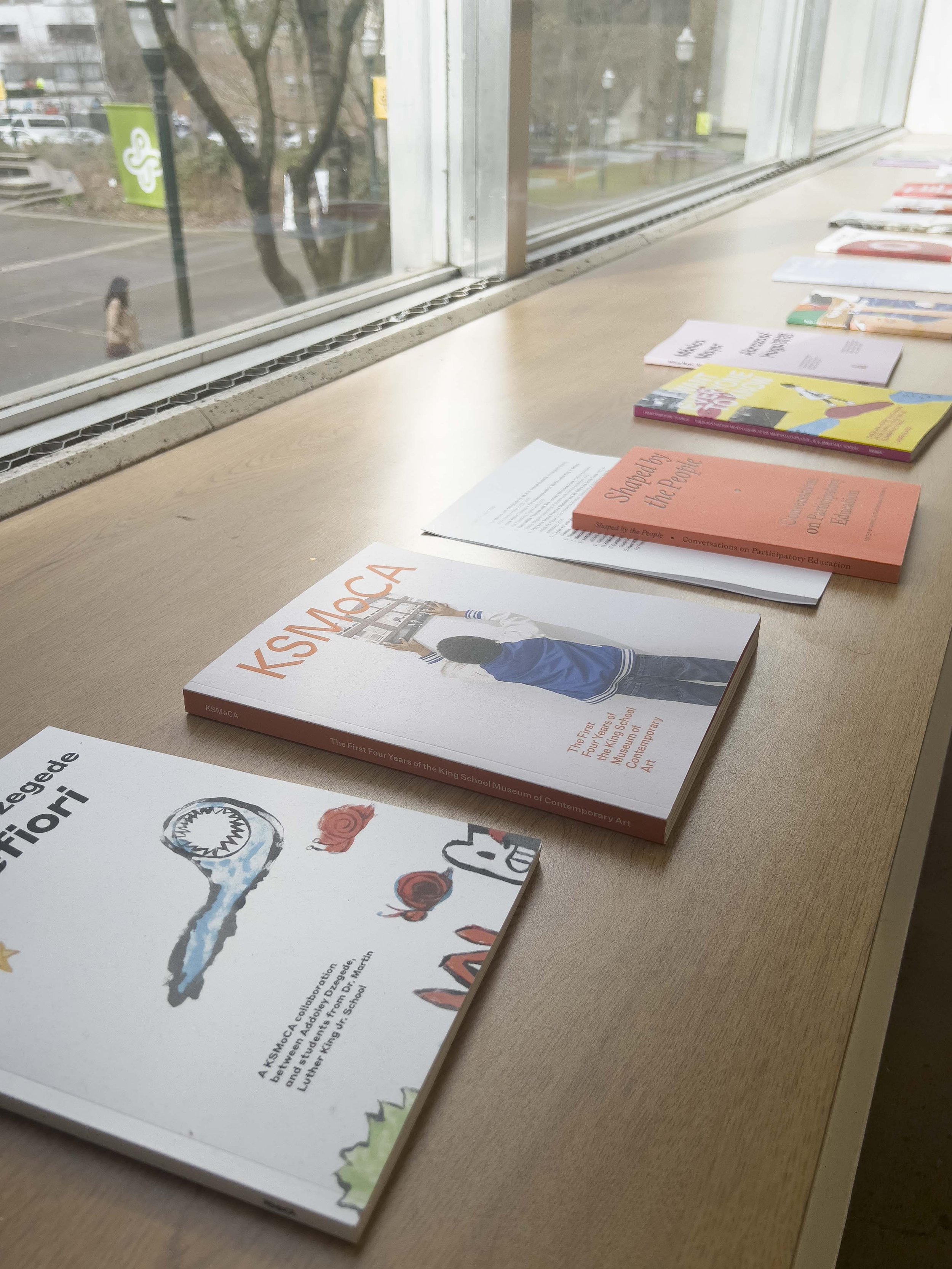
Welcome to My Happy Place
Curated by Rose and Dr. Kiara Hill for Littman Gallery at Portland State University
Rose and Dr. Kiara Hill lay out the exhibition
Watch a KPTV video feature of the exhibition here.
Welcome to My Happy Place is an exhibition curated by Rose, a fifth grader at Dr. Martin Luther King Jr. Elementary School and Dr. Kiara “Kiki” Hill, a professor in the School of Art + Design at PSU, that invites viewers to experience the magic that is the Dr Martin Luther King Jr School Museum of Contemporary Art (KSMoCA). KSMoCA is unique in that it’s a contemporary art museum housed inside of a public school that provides students and staff the opportunity to regularly engage with art and artists. On any given day you can walk the halls at Dr. MLK Jr. School and see student artwork of varying styles adorn the walls, engendering an atmosphere of creativity that serves to uplift and inspire anyone that walks into the space. This is the feeling we wanted to bring to this exhibition. The student work in this show is only a small part of our permanent collection. We curated these pieces to show the love and labor that makes KSMoCA a happy place for all. We hope you enjoy. –Rose and Kiki
A Conversation Between Rose and KiKi
The following is an abridged text comprised of several conversations that took place over a series of meetings as Kiki and Rose prepared for this exhibition.
KiKi: Hey Rose. So, I want to ask you a few questions about the show.
Rose: Mmmmmm
KiKi: So first off. You know how we decided to include an image of the reenactment sign and MLK school timeline to emphasize the importance of Dr. Martin Luther King Jr. to your school?
Rose: Yeah
KiKi: How do you feel about going to a school where the legacy of Dr. Martin Luther King Jr. is celebrated as much as it is? I ask because that is definitely not the case for every school named after him.
Rose: It feel great to be in this school. I think that’s why my parents picked it. They like him too. And when it’s his birthday we take it like a big celebration. Some kids even say that will dress up like him for Halloween! And then we learn a lot of new things about Martin Luther.
Kiki: That’s cool. So, I guess you would say you’re proud to go to your school?
Rose: Yeah. And then my teacher would be like. Like if we did something bad outside of the classroom she’d be like, ya’ll step outside of this room, ya’ll representing me. So I feel like if all the kids step outside the school, we are representing him. He didn’t technically build the school but when we step outside the school, we represent him.
Kiki: Cool, cool. That’s awesome. Let’s talk about a few of the pieces in the show now.
Rose: Mmmm
Kiki: Why did you want to include the Warhol animal prints?
Rose: I love those animal portraits. I don’t know why they took them down. They’re colorful and I love color. I dunno why.
Kiki: I mean, it makes sense. Color definitely influences your mood. What about the Layla Ali self-portrait series? You know the one with the expressive portraits of your classmates?
Rose: Oh, I was kind of scared of those drawings. I’m not even gonna lie. At first, I was like, why are they drawing themselves like that? But then I realized…oh, they are drawing their personalities.
Kiki: (laughs) So, do you like the series now?
Rose: The thing I liked about that series is that they get to draw each other. I love to draw. And I think that when kids get to draw each other it helps their skills.
Kiki: Dope, what about the For Freedoms digital quilt? Why did you want to include that piece?
Rose: Um, I think that project was pretty good, cause even though some kids were joking, and some kids were serious, it’s fun to like, talk about what you wanna be free of.
Kiki: Yea?
Rose: Like some kids would be joking, but I think for the kids that were being serious, they’d be like I want freedom from the police and stuff. Like some stuff on there is really serious.
Kiki: What did it feel like for you to see some of the more serious statements?
Rose: I was like, I could relate to that. I think I saw one that said they wanted to be free from racism. And that’s a good one.
Kiki: How does it feel to be at a school with art everywhere?
Rose: It makes me happy because sometimes I can relate to the art. And like, sometimes when the art gets taken down, I’m like, oh, what happened? And then when new ones come in, I be like, oh, that’s nice.
Kiki: What makes KSMoCA important, like from your perspective?
Rose: KSMoCA is important because they help. And in my eyes when other kids go to KSMoCA they come back, and their face is bright. They are always happy. And then I’m like, oh, so that’s what KSMoCA does to you. It makes you feel happy. It makes you feel good about the other kids, too.
Kiki: If you were going to use three words to describe KSMoCA what would you say?
Rose: I would say it’s beautiful, strong, and family.
Kiki: Okay, why those three?
Rose: Because if someone’s like, how do you know you can trust KSMoCa I’d say because my friends been there, I’ve been there and they’re like really trustworthy people. And then you got Black mentors. And then we get college students who are also our teachers so that’s great.
Kiki: Why is it important that you had a Black mentor?
Rose: I’ve always wondered if there would be Black mentors, but I never asked. Then when I saw you, I was so happy.
Kiki: (smiles). That’s dope. So beautiful, strong, family, right? Why beautiful?
Rose: The artwork.
Kiki: Why strong?
Rose: Because KSMoCA helps kids with their self-esteem. Some of the students come to school kind of moody. Like one of my friends was having a hard time but he went to KSMoCA and the next time I saw him I asked if he was good, and he said I’m great, they showed me a camera, and now he said he’s trying to learn how to control his mouth better.
Kiki: And then family?
Rose: Okay so not to be weird (laughs), but we’re like the babies and then KSMoCA steps in and is like, let me take care of these kids. They make us feel better.
Kiki: So almost like a home away from home?
Rose: Well, basically a third home for me (laughs). It feels like that because when I have a problem, I know it’s a place I can go to where they will help me. And it helps my self-esteem. Like when I’m talking to you, I feel better. Not better about myself, just better. Whenever something is weighing on me, I’m like let me just tell ya’ll what happened. Like if you can’t talk to your parents, you can tell KSMoCA and they’ll be like, oh it’s okay. And when kids hear that it makes them want to tell you more. It makes you feel like you can trust somebody.
Kiki: Makes sense.


















